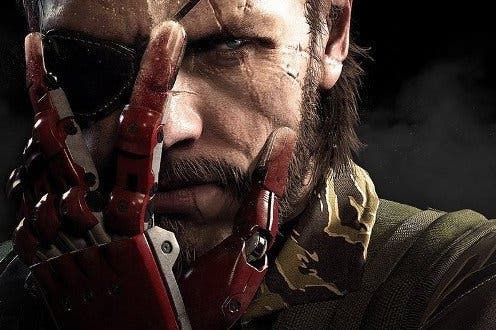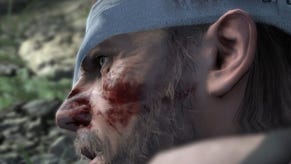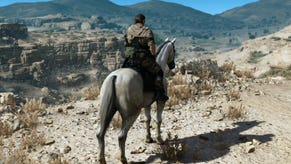The Phantom Pain is unlike other Metal Gear games
And unlike other open world games, too. Our early impressions ahead of review.
Editor's note: This is an early impressions piece of Metal Gear Solid 5: The Phantom Pain, based on a recent review event. Our full review from final retail code will be live in the near future.
Metal Gear Solid 5 is abrupt, aloof, and very, very brown.
In a year where The Witcher 3 set the new standard for open world gaming, Kojima's final bow makes for interesting playing. In many ways, The Phantom Pain is the antithesis of CD Projekt's lavish high-fantasy dazzler. The Witcher 3 is a game of meticulous world building, where rich environments meld with a sweeping narrative and winning characterisations. Swords aside, it is a warm bubble bath of a game.
In contrast, The Phantom Pain is wonderfully under-imagined. Afghanistan, where much of the early action takes place, isn't without its own sun-bleached beauty, but it remains as purposefully barren an open world as we've seen. It offers miles upon miles of desolation to explore on the back of your pooping horse - only occasionally punctuated by an enemy outpost, abandoned village or industrial military facility. Bold stuff.
Equally sparse are the game's story elements. Beyond an outlandish, action-packed opening sequence - which we're not allowed to go into detail on, but we can probably reveal that it involves a hell of a lot of butt crack - The Phantom Pain is a remarkably economical affair, telling its tale of '80s cold war subterfuge through snatches of radio dialogue (courtesy of Ocelot), and the occasional return to Mother Base between missions. It's fascinating to see such restraint from Kojima, a man well known for his self-indulgence and excess, especially considering that The Phantom Pain is likely his Metal Gear swan song.
That's not to say that Kojima's idiosyncrasies are nowhere to be found. This is still a game where you can parachute animals (and tanks and people) into the stratosphere on a whim, a game where you can make your horse crap on command, a game where you can strap a knife to your pet dog for more efficient killing, and a game which considers Kim Wilde's Kids in America as perfectly good musical accompaniment to traditional bouts of stealth.
All that stuff is a footnote in the grand scheme of things however, and - unlike most open world games, happy to bury their middling mechanics beneath an excess of window dressing - The Phantom Pain's strength is in the way it confidently allows its wonderful, fiercely-refined systems to come to the fore. Metal Gear Solid 5 is a game that delivers its singularly ambitious vision - absolute freedom within the stealth genre's familiar framework - with laser-focussed clarity.
Of course, if you've played last year's Ground Zeroes, you'll already have an inclining of Metal Gear's new-found focus on freedom - but The Phantom Pain goes considerably further. Ground Zeroes offered a single 20-minute infiltration mission (with a handful of variants,) that could easily stretch to countless hours thanks to the game's open-ended design and expansive tool-set. It was a giddying sandbox of simulated subterfuge that offered infinite possibilities once you had learned how to spot them. Now imagine the possibilities afforded when that same design ethos is applied across countless missions and a sprawling, constantly changing world.
In case it's not obvious though, The Phantom Pain isn't exactly a radical reinvention of the stealth genre. It's still a game of sometimes glacial subterfuge that borrows liberally from all across Metal Gear's history. You'll hide patiently in bushes, slip silently through the shadows and bonk unsuspecting enemies on the head to the strains of 80s pop. Even your objectives aren't particularly inventive (rarely getting more complex than 'stop this vehicle', 'kill this man' or 'blow up this funny-looking machine') - although Kojima still knows how to surprise with an outlandish set-piece. The difference is the sheer amount of freedom you're afforded to reach your goal.
That freedom begins even before you step out of your chopper onto the desert sand: prior to confirming your next mission, you'll have surveyed the landscape to choose the most efficient landing zone - using your topographical map to scout out secluded paths, or high vantage points from which you scan the horizon with your binoculars and tag every hostile below. It doesn't stop there though: you can select the landing time (with the time of day radically affecting visibility and the formation of enemy patrols), and even the AI companion you want to take into the field. Good luck deciding between your pooping horse and knife-wielding dog chum.
And then, once you land and begin traversing the environment, even more opportunities arise. Do you gallop toward your target on your trusty steed, sticking to the high mountain paths to avoid detection - or do you raid an enemy outpost, steal an armoured vehicle and complete your objective with ruthlessly efficient force? Do you stop to save prisoners at a secluded outpost and reap the rewards, even if it means potentially losing your main target? What makes the the Phantom Pain most thrilling is that, often, these are choices that you'll need to make on the fly.
Metal Gear Solid 5's open world might not be vast, varied or stuffed full of things to do, but it's a place of constant movement. Night falls, day breaks, sandstorms sweep in, patrols come and go - and this organic sense of life means that missions are never predictable (no matter how often you play them) with tactical possibilities arising all the time. It's a game of planning and reacting in a world that refuses to stand still, making every minute matter and every success feel earned.
Equally antithetical to the current model of open world design is The Phantom Pain's remarkable lack of padding - everything you do feels meaningful and consequential. Guard posts and roaming patrols aren't simply there for colour as you traverse the world: one careless move into hostile territory and every single enemy on the map will know you're coming, with more search parties and increased security radically altering the way a mission unfolds. And while other games tout choice and consequence as a headline feature, the Phantom Pain just gets on with it. Even the smallest action can have unexpected consequences - some significant and others barely perceptible.
An early Side Ops mission, for instance, presents you with the seemingly routine task of extracting a translator from out in the field. Do it and you'll suddenly be able to understand everything your Russian opponents say. Without warning, you're able to interrogate enemies or eavesdrop conversations - each new piece of intel, revealing new tactical possibilities or new objectives - each potentially leading to equally meaningful rewards. Elsewhere, you might decide to save a target marked for execution and, suddenly you're granted a new ally out in the field or a skilled worker who can be assigned to your burgeoning medical, intel and research teams - expanding your strategic opportunities and tactical considerations even further. This constant feedback loop is incredible, with every possible action promising greater discoveries.
The dense zaniness that has defined Metal Gear seems to have been largely transposed from the story to your moment to moment actions, and to a dense open world that's surprisingly taut and refined, coursed with rich strategy that plays both on and off the field. Metal Gear Solid 5 is a different type of open world game, then, and a different type of Metal Gear game. After playing through a chunk of the Phantom Pain's campaign, there's every reason to think that Kojima's last entry in the series may well be his best yet.











